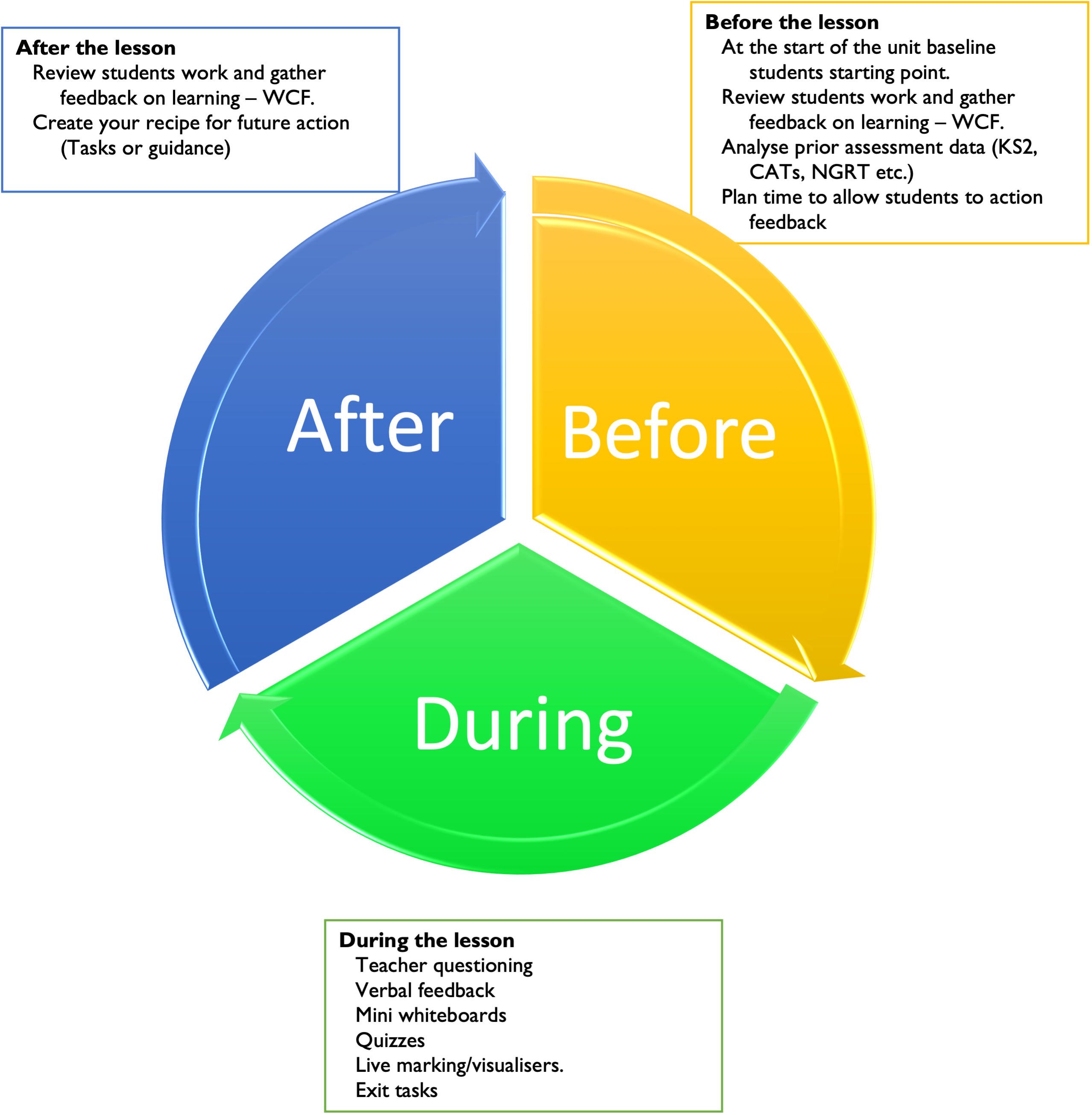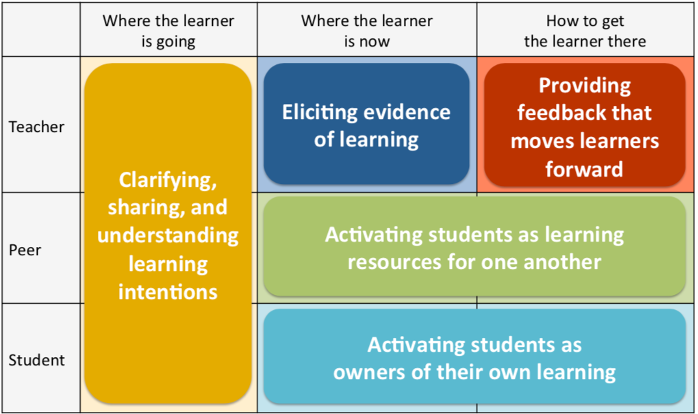ASSESSMENT, REPORTING AND MARKING
Responsive Teaching
ASSESSMENT, REPORTING AND MARKING
Responsive Teaching
ASSESSMENT, REPORTING AND MARKING
Responsive Teaching
Home > Assessment, Reporting and Marking > Responsive Teaching

‘Formative assessment’ or ‘Responsive Teaching’
Dylan Wiliam has suggested that ‘Formative Assessment’ should really be called ‘Responsive teaching’. The rationale behind this is that teachers should adapt their teaching based on feedback from students in order to maximise student progression. Teacher feedback should:
- Have a positive impact on the student;
- Improve the student, not just a piece of work – ‘A recipe for future action’ to improve future work;
- Make the students think;
- Be followed by time to respond to the feedback;
The first fundamental principle of effective classroom feedback is that feedback should be more work for the recipient than the donor.
5 stages of effective formative assessment
The key principles are echoed by the DfE workload review report ‘Eliminating unnecessary workload around marking’, March 2016, which states that:
“all marking should be meaningful, manageable and motivating”.
Key Expectations
- Consistency – Teachers must ensure that feedback is given in accordance with school guidelines and faculty assessment and feedback procedures to ensure consistency and low variance;
- Intelligent task setting – ensure that tasks you set students are created in such a way as to allow opportunities to reveal something about a student’s strengths and weaknesses, thus providing opportunities for effective feedback;
- Communication – It is important for student learning that teachers clearly communicate learning intentions and model/exemplify what counts as excellent work;
- Verbal feedback – Students value verbal feedback because its impact is immediate. Teachers must aim to seek opportunities within lessons to provide effective verbal feedback when it is appropriate to do so;
- Whole Class Feedback (WCF) – This is an excellent way to provide timely and detailed feedback on a regular basis. The process is outlined below:
- Read through the student’s work – read all the student’s work before the next lesson so that feedback flows as part of the learning sequence.
- Strengths – Identify common strengths and stress these to reinforce them with students, possibly showcasing some excellent examples.
- Areas for improvement – list any common misconceptions, spelling errors of further areas for improvement.
- Give feedback – Present this to the class, either a 1 slide presentation or show your notes under a visualiser and showcase the examples of excellence.
- Allow time for improvement – make students think about the feedback by creating opportunities, designing tasks and allowing time for students to act on the feedback.
- Timing – The timing of feedback “should be left to the careful judgement of the classroom teacher”, (Collin and Quigley 2021). They should consider:
- The Task (Some tasks allow for immediate feedback for students to correct errors e.g. playing an instrument as students realise their own errors and some, such as essay writing, may need more immediate feedback from the teacher as errors are harder to spot).
- The Student (Students may need different guidance or prompts after different stages of a task);
- The Class (A teacher may recognise a common misconception across the class that may need correcting, such as a misunderstanding regarding definitions of key vocabulary);
- Recall – When appropriate, regular low-stakes testing and quizzing must be a key feature of schemes of learning in order to provide feedback for students, enabling them to identify gaps in their learning and what they must do to improve;
- Written marking – When providing written comments on students’ work the comments must be presented in a way that is meaningful to students and supports progression in their learning;
- Time to respond – It is important to give students quality time in lessons to respond to feedback. These opportunities should aim to improve the student and their ability to deal with similar tasks in the future, not just improving one piece of work. In allowing this time to action feedback we complete the ‘feedback loop’;
- Grades – When giving a grade teachers must consider the impact of giving it after the developmental feedback so that students can first of all engage with the developmental feedback.
Never grade students while they are still learning.
- Peer and self-assessment – these can be used at appropriate times during a sequence of learning to promote self-regulation and improved metacognition. They should only be used when they will have noticeable impact on progress.
See ‘The Responsive Teaching’ PD booklet for more details on strategies.
Literacy-Focused Marking – Guidelines
In that every teacher is a teacher of literacy, it is appropriate that we all must comment on spelling, punctuation and grammar when errors are evident. Teachers are also encouraged to use strategies that encourage students themselves to identify SPaG errors and self-correct accordingly.
The following whole school literacy codes are available and can be used to direct children to errors, though these should not be used in isolation:
C Capital letter
Sp Spelling Error
P Punctuation – Full stops, commas for lists and question marks.
// New Paragraph
^ Word(s) missing.
Basic grammatical errors must be acted upon by teachers. That said, discretion should be used by teachers when marking for literacy. For example, with low prior attaining students it may be more appropriate to focus on the most common or most important errors to develop the basics of SPaG – too many alterations could undermine confidence. However, it is important to correct (or provide strategies for students to employ) misspelling of high frequency words and/or subject-specific terminology.
Each faculty have identified which pieces of work, or key terminology, which should be the focus of literacy feedback.
Green Pen Marking
Revisiting, editing, and acting upon feedback is good practice, and can develop written accuracy. Students should complete all self-marking and editing of work in green pen, though it may be appropriate for longer redrafts to use their usual blue or black pen, in line with school policy.
Summary - A feedback loop



